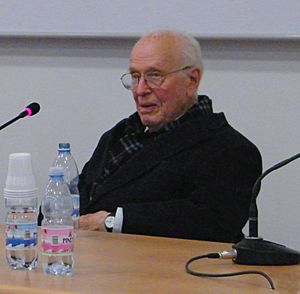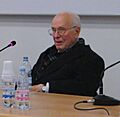Luigi Luca Cavalli-Sforza facts for kids
Quick facts for kids
Luigi Luca Cavalli-Sforza
|
|
|---|---|

Cavalli-Sforza, October 2010.
|
|
| Born | 25 January 1922 |
| Died | 31 August 2018 (aged 96) |
| Awards | Weldon Memorial Prize (1978) Balzan Prize (1999) Mendel Medal (2002) |
| Scientific career | |
| Fields | Genetics |
Luigi Luca Cavalli-Sforza (born January 25, 1922 – died August 31, 2018) was an Italian scientist. He was a geneticist who studied population genetics. This field looks at how genes change in groups of people over time. He taught at several universities, including Stanford University in the United States.
Contents
Life and Education
Luigi Luca Cavalli-Sforza was born in Genoa, Italy. He became a doctor in 1944 after studying at the University of Pavia.
Early Career and Research
In 1949, Cavalli-Sforza started working at Cambridge University in England. He joined the genetics department there. He studied the genetics of a type of bacteria called E. coli.
After a year, he returned to Italy to teach. He worked at universities in Parma and Pavia. Then, in 1970, he moved to the United States. He became a professor at Stanford University. He worked at Stanford until he retired in 1992.
Awards and Honors
Cavalli-Sforza received many important awards for his work. In 1999, he won the Balzan Prize. This award was for his studies on how humans first appeared. He also became a member of the Pontifical Academy of Sciences in 1994. In 1992, he was chosen as a Foreign Member of the Royal Society of London. This is a very old and respected science group.
Key Discoveries and Studies
Cavalli-Sforza was a pioneer in combining different fields of study. He used information about how populations grow and move. He also looked at blood groups in people. This helped him understand human history.
Studying Human Evolution
Working with another scientist, Anthony W. F. Edwards, Cavalli-Sforza developed new ways to study evolutionary trees. These trees show how different groups of people are related over time. They looked at how genes spread between groups through migration. Their early work was very important for understanding human genetic differences.
Genes and Culture
Cavalli-Sforza also started a new area of study called gene-culture coevolution. This field looks at how our genes and our culture influence each other. Culture includes things like language, traditions, and ideas.
In 1981, he wrote a book called Cultural Transmission and Evolution. In this book, he used ideas from genetics to explain how cultural traits are passed on. This research helped scientists understand how genes and culture spread together.
Language and Migration
He also studied how language differences might affect gene flow. This means how genes move between different groups of people. He looked at ideas from linguists about large language families. His work helped explore the links between language, genes, and human migration.
Books and Publications
Cavalli-Sforza wrote several important books. They helped explain his complex research to a wider audience.
Genes, Peoples, and Languages
In his book Genes, Peoples, and Languages, he explained his work for everyone. This book talks about five main topics. It challenges the idea that human "races" have big genetic differences. It suggests that the idea of race might not be useful in biology.
The book also explores how humans spread across the world over the last 150,000 years. It shows how human diversity came to be. Cavalli-Sforza suggested that Europeans have ancestors from both Asia and Africa.
Other Important Books
Another major work was The History and Geography of Human Genes (1994). He wrote this with Paolo Menozzi and Alberto Piazza. It is a key book for understanding human genetic variation.
He also wrote The Great Human Diasporas with his son Francesco. This book explores the history of human diversity and evolution.
Earlier, in the 1970s, he wrote a textbook with Walter Bodmer. It was called The Genetics of Human Populations. This book was a standard for human genetics at the time. They later wrote another book together, Genetics, Evolution, and Man. These books helped define the field of human genetics before new technologies emerged.
Later Life and Legacy
Professor Cavalli-Sforza passed away on August 31, 2018. He was 96 years old. He died at his home in Belluno, Italy. He left behind his three sons, Matteo, Francesco, and Luca Tommaso, and his daughter, Violetta. His work continues to influence how we understand human genetics, history, and culture.
Films
- 2003 – Journey of Man
Images for kids
See also
 In Spanish: Luigi Luca Cavalli-Sforza para niños
In Spanish: Luigi Luca Cavalli-Sforza para niños


